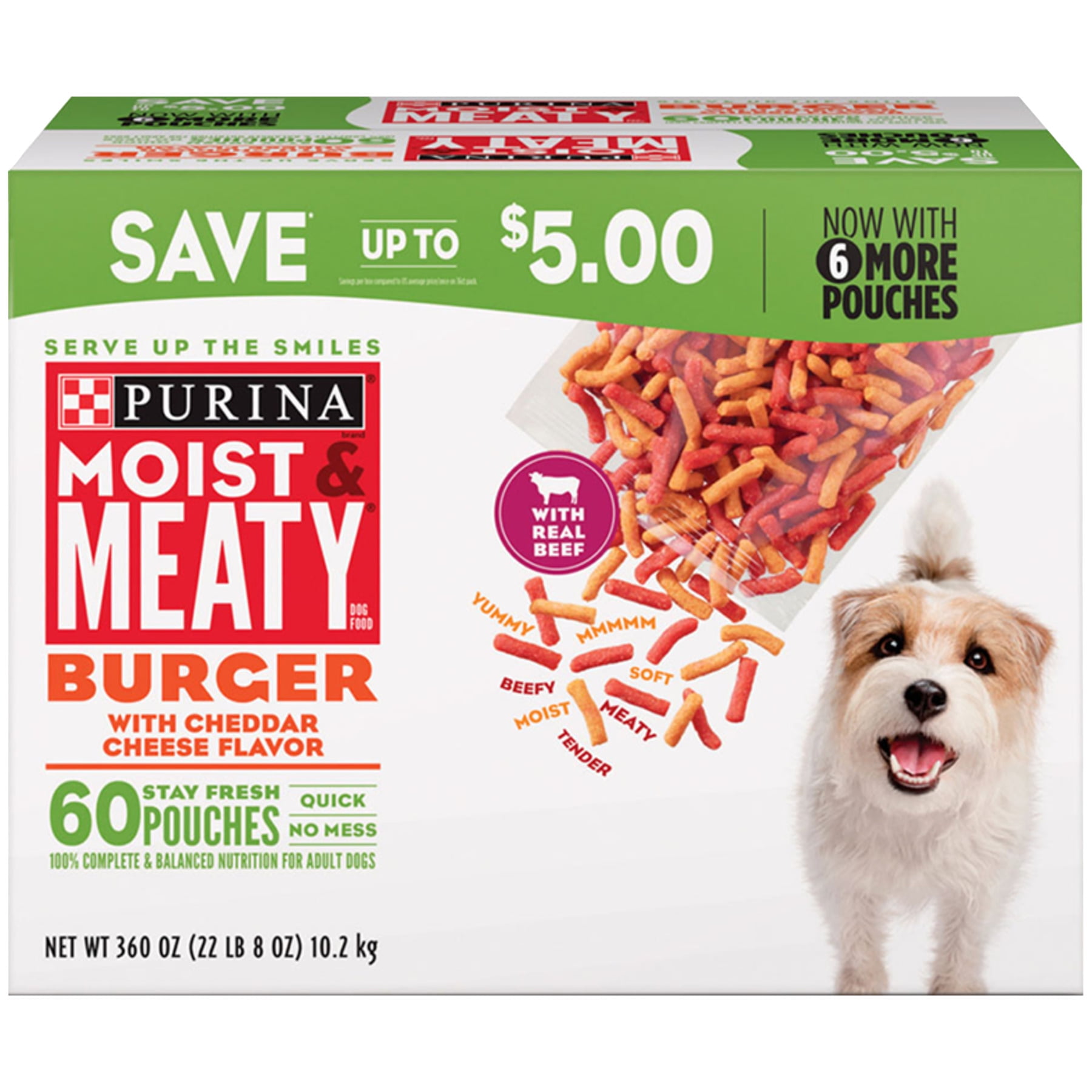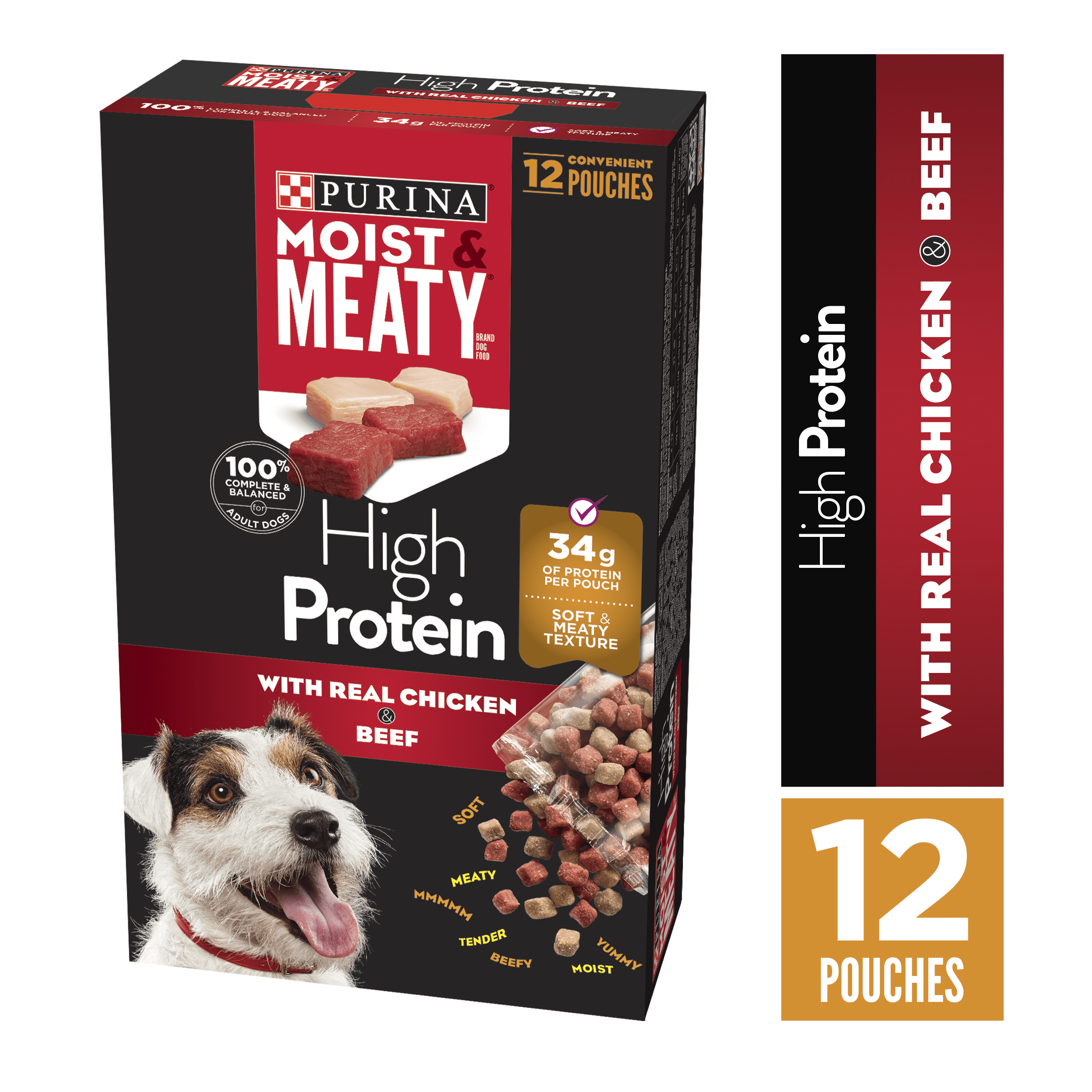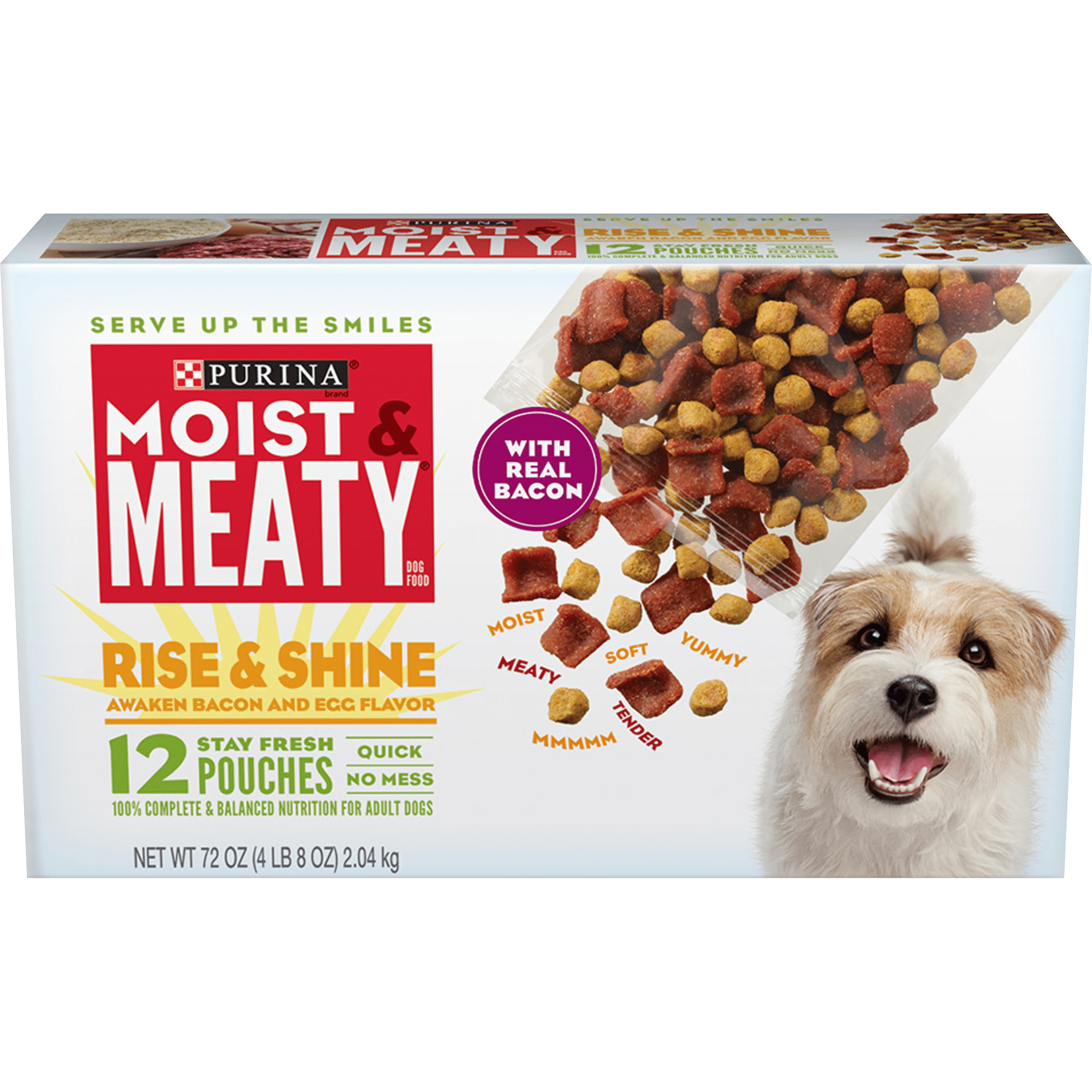As moist and meaty dog food takes center stage, this opening passage beckons readers into a world crafted with expertise and passion, ensuring a reading experience that is both informative and engaging. Dive in as we explore the delectable depths of this canine culinary delight, uncovering its nutritional benefits, delectable flavors, and essential role in canine health and happiness.
Definition and Characteristics of Moist and Meaty Dog Food
Moist and meaty dog food is a type of pet food that is characterized by its high moisture content and meat-based ingredients. It is typically made with a combination of fresh or frozen meat, water, and other ingredients such as grains, vegetables, and vitamins.
Moist and meaty dog food has a soft, succulent texture that is easy for dogs to chew and digest. It is also highly palatable, making it a popular choice among dogs of all ages and breeds.
Appearance
Moist and meaty dog food typically has a light brown or beige color. It may contain small pieces of visible meat, as well as chunks of vegetables or grains.
Flavor
Moist and meaty dog food has a savory, meaty flavor that is appealing to most dogs. The specific flavor profile of the food will vary depending on the type of meat used, as well as the other ingredients added.
Benefits of Moist and Meaty Dog Food
Moist and meaty dog food offers a range of nutritional and health benefits for dogs. These benefits include:
- Enhanced hydration:Moist and meaty dog food contains a high moisture content, which helps keep dogs hydrated and prevents dehydration, especially important for active or senior dogs.
- Improved digestion:The high moisture content in moist and meaty dog food also aids in digestion, making it easier for dogs to break down and absorb nutrients.
- Increased palatability:Moist and meaty dog food is typically more palatable than dry food, making it more appealing to dogs and encouraging them to eat more consistently.
- Weight management:Moist and meaty dog food can help dogs feel fuller faster due to its high moisture content, which may help with weight management.
- Dental health:The chewing action required to eat moist and meaty dog food can help keep dogs’ teeth clean and reduce tartar buildup.
Overall, moist and meaty dog food provides numerous benefits for dogs, including improved hydration, digestion, palatability, weight management, and dental health.
Ingredients and Composition of Moist and Meaty Dog Food

Moist and meaty dog food is formulated to provide a balanced diet for dogs, containing a blend of ingredients that meet their nutritional requirements. These ingredients can be categorized into protein sources, carbohydrates, fats, and vitamins/minerals, each playing a crucial role in supporting the overall health and well-being of dogs.
The following table lists the common ingredients found in moist and meaty dog food, along with their respective categories and importance:
Protein Sources
- Meat:High-quality meat sources, such as chicken, beef, or lamb, provide essential amino acids, which are the building blocks of proteins. Proteins are crucial for muscle development, tissue repair, and enzyme production.
- Fish:Fish, like salmon or tuna, is another excellent source of protein and omega-3 fatty acids, which support skin and coat health, as well as cognitive function.
- Eggs:Eggs are a complete protein source, meaning they contain all the essential amino acids. They are also a good source of vitamins and minerals, including riboflavin, selenium, and iron.
Carbohydrates
- Grains:Grains, such as brown rice, oats, or barley, provide carbohydrates for energy and fiber for digestive health.
- Vegetables:Vegetables, like carrots, peas, or sweet potatoes, offer carbohydrates, vitamins, minerals, and antioxidants.
- Fruits:Fruits, such as apples or blueberries, provide carbohydrates, vitamins, and antioxidants.
Fats
- Animal fats:Animal fats, derived from meat or poultry, provide energy and essential fatty acids, such as omega-3 and omega-6, which support skin and coat health, as well as joint function.
- Plant oils:Plant oils, like canola oil or sunflower oil, are rich in omega-6 fatty acids and provide energy.
Vitamins and Minerals
- Vitamins:Vitamins, such as vitamin A, vitamin C, and vitamin E, are essential for overall health, immune function, and vision.
- Minerals:Minerals, like calcium, phosphorus, and potassium, support bone health, muscle function, and nerve transmission.
The specific combination and proportions of these ingredients in moist and meaty dog food vary depending on the brand and formula. However, all reputable brands should provide a complete and balanced diet that meets the nutritional needs of dogs at different life stages and activity levels.
Comparison to Other Types of Dog Food

Moist and meaty dog food stands out from other types of dog food due to its unique combination of texture and nutritional value.
Compared to dry kibble, moist and meaty dog food is softer and easier to chew, making it suitable for dogs with dental issues or older dogs with reduced jaw strength. It also contains more moisture, which can be beneficial for dogs that have difficulty staying hydrated.
Canned Food
While both moist and meaty dog food and canned food are soft and moist, moist and meaty dog food typically has a higher meat content and a lower moisture content. This makes it a more concentrated source of protein and nutrients.
Raw Food, Moist and meaty dog food
Moist and meaty dog food is a convenient alternative to raw food, offering similar nutritional benefits without the risks associated with handling and storing raw meat. It is also more shelf-stable than raw food, making it easier to store and transport.
Moist and meaty dog food is a great way to keep your furry friend happy and healthy. It’s packed with protein and other essential nutrients that dogs need to thrive. If you’re looking for a high-quality moist and meaty dog food, I recommend checking out whole hearted dog food . It’s made with real meat and vegetables, and it’s free of artificial flavors and preservatives.
Your dog will love the taste, and you’ll love the peace of mind that comes from knowing that you’re feeding your pet a healthy diet. And, back to moist and meaty dog food, it’s also a great way to keep your dog’s coat healthy and shiny.
Selection and Feeding Guidelines

When selecting moist and meaty dog food, consider your dog’s age, breed, and health conditions. Puppies and senior dogs may have different nutritional needs than adult dogs. Certain breeds, such as those with sensitive stomachs, may benefit from hypoallergenic or limited-ingredient formulas.
Dogs with health conditions, such as kidney disease or diabetes, may require specialized diets.
Feeding Amounts and Frequency
Feeding amounts and frequency depend on your dog’s size, activity level, and individual needs. Generally, adult dogs should be fed 2-3 meals per day, while puppies and senior dogs may require more frequent feedings. The amount of food you give your dog should be based on their weight and the calorie content of the food.
Consult with your veterinarian for specific feeding recommendations based on your dog’s unique needs.
Potential Risks and Considerations: Moist And Meaty Dog Food
Moist and meaty dog food, while nutritious, does come with certain risks and considerations. It’s important to be aware of these potential drawbacks before incorporating this type of food into your dog’s diet.
Spoilage
One of the primary concerns with moist and meaty dog food is its susceptibility to spoilage. The high moisture content creates a favorable environment for bacteria to thrive. If not stored properly, the food can quickly become rancid and unsafe for consumption.
To minimize the risk of spoilage, always store moist and meaty dog food in a cool, dry place and discard any uneaten portions within a few days of opening.
Allergies
Some dogs may be allergic to certain ingredients found in moist and meaty dog food, such as beef, chicken, or wheat. If your dog experiences symptoms such as itching, vomiting, or diarrhea after eating this type of food, it’s important to consult with a veterinarian to determine if an allergy is the cause.
Dental Health
Moist and meaty dog food can be sticky and cling to your dog’s teeth, which can contribute to plaque and tartar buildup. To maintain good dental health, it’s important to brush your dog’s teeth regularly and provide dental chews or toys to help remove plaque and tartar.
Last Recap
In the realm of canine nutrition, moist and meaty dog food reigns supreme, offering a symphony of flavors and an abundance of health benefits. Whether you’re a seasoned dog owner or a first-time pet parent, this guide has equipped you with the knowledge to make informed choices about your furry friend’s diet.
Embrace the joy of providing your canine companion with the nourishment and taste they deserve, ensuring a long and healthy life filled with wagging tails and happy barks.


